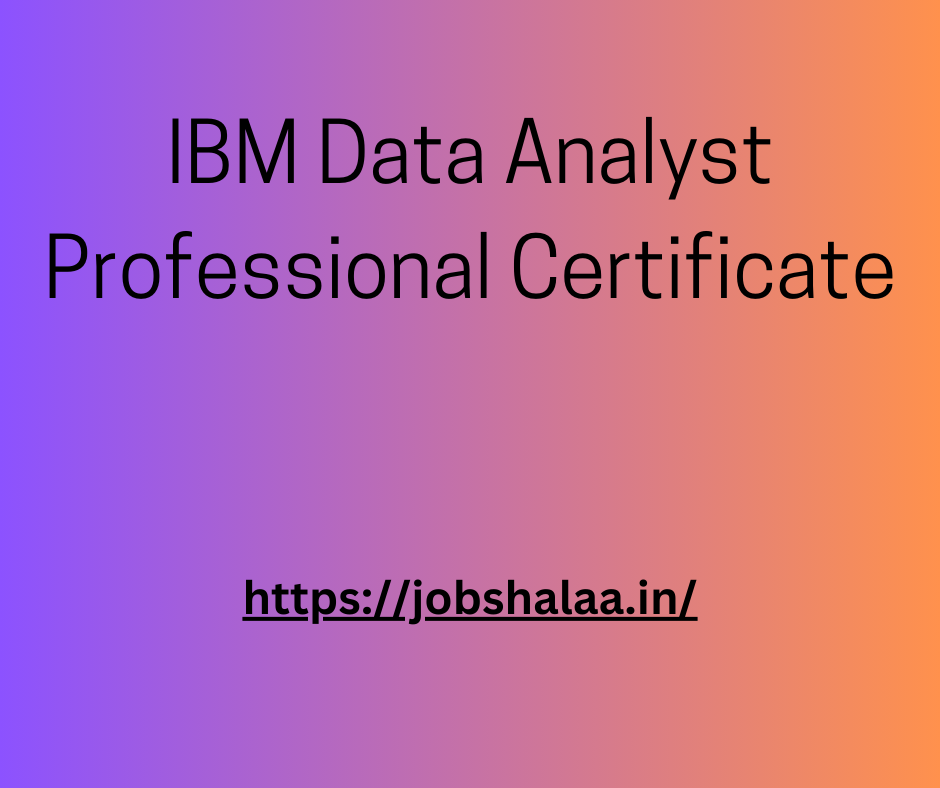The IBM Data Analyst Professional Certificate is a comprehensive online program designed to help individuals develop the essential skills needed for a career in data analysis. Created by IBM, this certificate is offered through various platforms like Coursera, with a focus on teaching the tools, techniques, and foundational concepts necessary for analyzing data effectively.

The primary goal of this program is to prepare learners for entry-level roles in the field of data analytics. It is aimed at individuals with little to no prior experience in data analysis, making it accessible to a wide audience. Upon completion, learners will have developed critical thinking skills related to data collection, analysis, and visualization, which are highly valued in today’s data-driven world.
The course is composed of several modules, each designed to build on the knowledge gained in the previous one. The curriculum begins with the basics of data analysis and progresses to more advanced topics, such as using specialized tools and applying statistical techniques to real-world datasets. The end goal is for students to be able to confidently handle a variety of tasks, from data cleaning and preparation to advanced data visualization and statistical analysis.
Core Components and Structure
The IBM Data Analyst Professional Certificate program consists of nine courses, each covering a different aspect of data analysis. These courses are structured to provide a balance of theoretical knowledge and practical experience. Some of the key courses are:
- Introduction to Data Analytics: This course lays the foundation for the program. It introduces the role of a data analyst, the tools they use, and the types of problems they solve. Learners also explore the importance of data in decision-making across industries.
- Excel Basics for Data Analysis: Excel is one of the most widely used tools in data analysis. This course teaches learners how to use Excel for data manipulation, including sorting, filtering, pivot tables, and simple statistical functions. Excel remains a key tool, especially for professionals in small to mid-sized organizations.
- Data Visualization and Dashboards with Excel and Cognos: Once data is collected and analyzed, it’s crucial to present findings in a way that others can understand. This course focuses on creating effective visualizations and dashboards. IBM’s Cognos Analytics platform is also introduced, providing learners with hands-on experience in using professional-grade visualization tools.
- Python for Data Science and AI: Python has become the go-to programming language for data analysis due to its versatility and rich ecosystem of libraries. In this course, learners are introduced to Python programming and its application in data analysis. Libraries such as Pandas and NumPy are covered, offering students the ability to manipulate large datasets.
- Databases and SQL for Data Science: Data analysts often need to extract data from large databases. This course teaches learners how to use SQL (Structured Query Language) to query databases, join tables, and perform aggregations. Understanding SQL is essential for any aspiring data analyst, as it allows for the retrieval of specific datasets from relational databases.
- Data Analysis with Python: Building on the earlier Python course, this module delves deeper into how Python can be used for more advanced data analysis tasks. Learners get hands-on experience in analyzing data using libraries like Matplotlib, Seaborn, and Scikit-learn. These tools are essential for creating visualizations and performing statistical analyses.
- Data Visualization with Python: Visualizing data is a critical skill for data analysts. In this course, students learn how to use Python’s visualization libraries to create compelling graphs and charts. The focus is on Matplotlib and Seaborn, two libraries that allow for highly customizable and complex visualizations.
- Applied Data Science Capstone: The capstone project is a culmination of everything learned throughout the program. It challenges students to apply their skills to a real-world dataset. By the end of the capstone, students will have a comprehensive portfolio piece that demonstrates their ability to analyze data from start to finish, including cleaning, analysis, and visualization.
Tools and Technologies Covered
The IBM Data Analyst Professional Certificate exposes learners to several important tools and technologies commonly used in the field of data analysis. Some of the primary tools include:
- Excel: Though often considered a basic tool, Excel’s versatility in data analysis tasks cannot be overstated. Students learn to use advanced Excel functions for sorting, filtering, and summarizing data, along with creating pivot tables and basic visualizations.
- Cognos Analytics: As IBM’s business intelligence tool, Cognos offers learners a way to build interactive dashboards and visualizations. Its use in the program introduces students to professional-grade tools that are widely used in business environments.
- Python: As one of the most popular programming languages for data analysis, Python plays a crucial role in the curriculum. Learners are introduced to key libraries such as Pandas, NumPy, Matplotlib, and Seaborn, which enable them to manipulate and visualize data effectively.
- SQL: This database management language is essential for retrieving and manipulating data stored in relational databases. SQL skills are highly sought after in the job market, and this program provides hands-on experience with real databases.
Practical Applications and Job Relevance
A major strength of the IBM Data Analyst Professional Certificate is its emphasis on practical, real-world applications. Each course incorporates hands-on labs, exercises, and projects, ensuring that learners not only understand the theoretical concepts but also know how to apply them in practice. This practical focus makes the certificate highly relevant for job seekers.
Upon completion, learners can apply for entry-level positions such as junior data analysts, business analysts, and data scientists. Employers look for candidates who can interpret data, present insights, and make data-driven recommendations. The skills taught in this program align with those requirements, giving graduates a competitive edge.
Additionally, learners will build a portfolio throughout the program, including the capstone project. This portfolio is invaluable when applying for jobs, as it provides tangible evidence of the learner’s skills and abilities. Completing the IBM Data Analyst Professional Certificate also results in a badge from IBM, which can be shared on LinkedIn and other professional networks.
Get your certificate from here
Time Commitment and Flexibility
The IBM Data Analyst Professional Certificate is designed to be flexible, making it suitable for individuals who are working or have other commitments. The entire program can be completed in approximately six months, assuming a learner dedicates about 10 hours per week. However, the pace is self-guided, meaning that learners can complete the program more quickly or take longer, depending on their personal schedules.
This flexibility is one of the main advantages of the program. Students have the freedom to learn at their own pace and revisit material as needed. All courses are online, making it accessible to anyone with an internet connection, regardless of geographical location.
